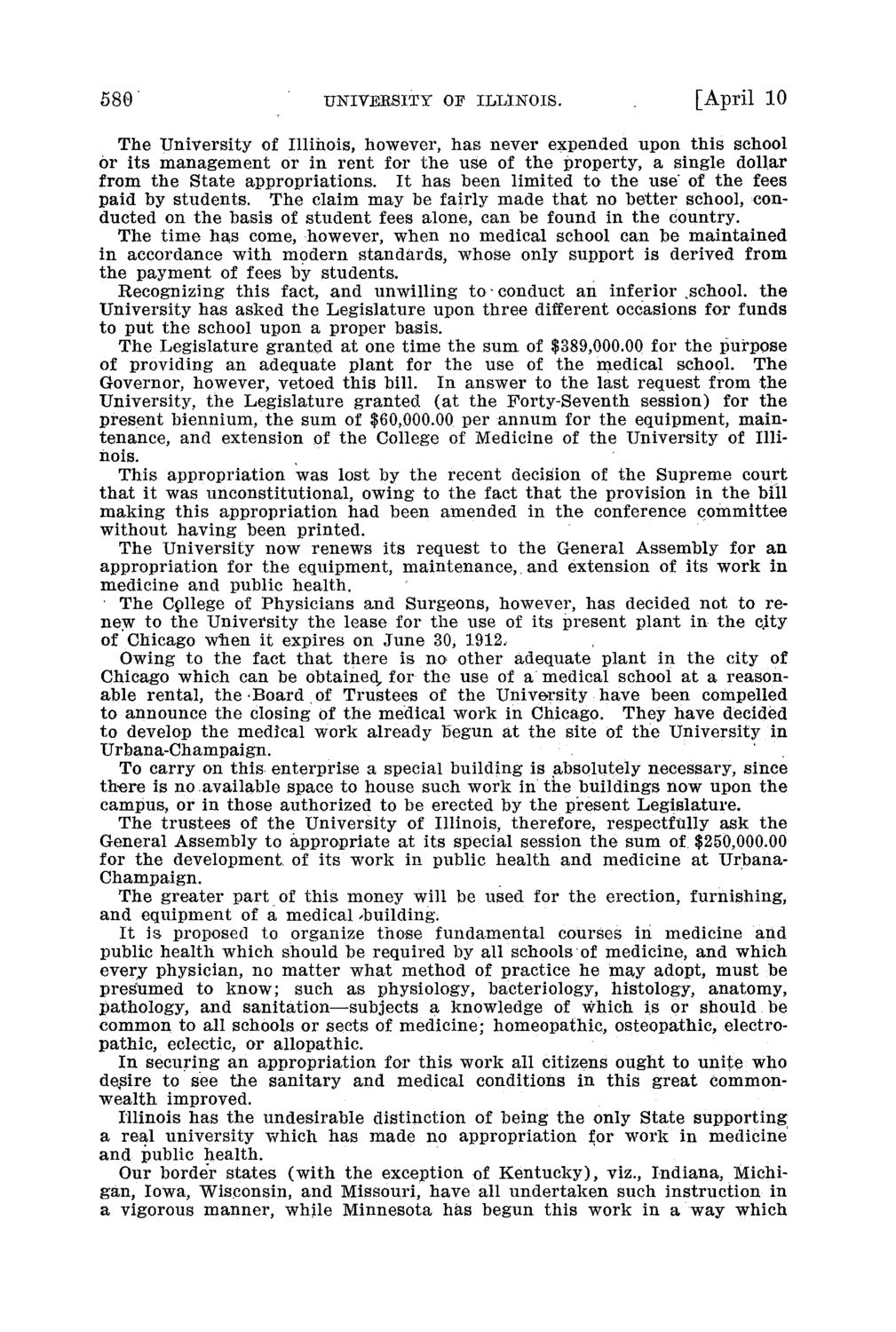| |
| |
Caption: Board of Trustees Minutes - 1912
This is a reduced-resolution page image for fast online browsing.

EXTRACTED TEXT FROM PAGE:
580' UNIVERSITY OF ILLINOIS. [April 10 The University of Illinois, however, has never expended upon this school or its management or in rent for the use of the property, a single dollar from the State appropriations. It has been limited to the use' of the fees paid by students. The claim may be fairly made that no better school, conducted on the basis of student fees alone, can be found in the country. The time has come, however, when no medical school can be maintained in accordance with modern standards, whose only support is derived from the payment of fees by students. Recognizing this fact, and unwilling to - conduct an inferior .school, the University has asked the Legislature upon three different occasions for funds to put the school upon a proper basis. The Legislature granted at one time the sum of $389,000.00 for the purpose of providing an adequate plant for the use of the medical school. The Governor, however, vetoed this bill. In answer to the last request from the University, the Legislature granted (at the Forty-Seventh session) for the present biennium, the sum of $60,000.00 per annum for the equipment, maintenance, and extension of the College of Medicine of the University of Illinois. This appropriation was lost by the recent decision of the Supreme court that it was unconstitutional, owing to the fact that the provision in the bill making this appropriation had been amended in the conference committee without having been printed. The University now renews its request to the General Assembly for an appropriation for the equipment, maintenance, and extension of its work in medicine and public health. The Cpllege of Physicians and Surgeons, however, has decided not to renew to the University the lease for the use of its present plant in the c.ity of Chicago when it expires on June 30, 1912, Owing to the fact that there is no other adequate plant in the city of Chicago which can be obtained, for the use of a medical school at a reasonable rental, the Board of Trustees of the University have been compelled to announce the closing of the medical work in Chicago. They have decided to develop the medical work already begun at the site of the University in Urbana-Champaign. To carry on this enterprise a special building is absolutely necessary, since there is no available space to house such work in the buildings now upon the campus, or in those authorized to be erected by the present Legislature. The trustees of the University of Illinois, therefore, respectfully ask the General Assembly to appropriate at its special session the sum of $250,000.00 for the development of its work in public health and medicine at UrbanaChampaign. The greater part of this money will be used for the erection, furnishing, and equipment of a medical ^building. It is proposed to organize those fundamental courses in medicine and public health which should be required by all schools of medicine, and which every physician, no matter what method of practice he may adopt, must be presumed to know; such as physiology, bacteriology, histology, anatomy, pathology, and sanitation—subjects a knowledge of which is or should be common to all schools or sects of medicine; homeopathic, osteopathic, eleetropathic, eclectic, or allopathic. In securing an appropriation for this work all citizens ought to unite who desire to see the sanitary and medical conditions in this great commonwealth improved. Illinois has the undesirable distinction of being the only State supporting a real university which has made no appropriation for work in medicine and public health. Our border states (with the exception of Kentucky), viz., Indiana, Michigan, Iowa, Wisconsin, and Missouri, have all undertaken such instruction in a vigorous manner, while Minnesota has begun this work in a way which
| |